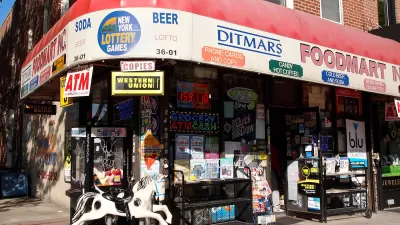Accepted by planners as a way to make buildings feel less 'crowded' and baked into many zoning codes, setbacks achieve no benefit other than giving opponents of development a bargaining chip.

"Received wisdom holds that setbacks make urban spaces feel less crowded. They supposedly ensure that buildings do not overshadow streets and sidewalks. They create the illusion of less density and protect buildings’ personal space. They create room for 'green space,' 'light,' and 'park-like settings,' which sound great in real estate listings. They assume that buildings are impositions on their cityscapes, to be contained so as not to offend delicate sensibilities."
"To the proponents of setbacks, a few patches of grass might as well be Luxembourg Gardens. But think about the classic street in any of the cities I cited above. If you enjoy Paris or New York, you already know why you shouldn’t like setbacks. Density in a city is good. And not just population density. The actual appearance of density (which may or may not have anything to do with population density, depending on the type of structure in question) is good, too."
"Setbacks are the currency of anti-development activism. Homeowners who like their cities and their property values just fine don’t care how far away a building is from a street. They’re likely only to see those buildings at 35 miles per hour anyway, and probably from a lane or two away (plus a few feet if there’s a devil strip). But they know how to push planners around."
FULL STORY: Why Cities Should Back Off of Setbacks

Alabama: Trump Terminates Settlements for Black Communities Harmed By Raw Sewage
Trump deemed the landmark civil rights agreement “illegal DEI and environmental justice policy.”

Planetizen Federal Action Tracker
A weekly monitor of how Trump’s orders and actions are impacting planners and planning in America.

Why Should We Subsidize Public Transportation?
Many public transit agencies face financial stress due to rising costs, declining fare revenue, and declining subsidies. Transit advocates must provide a strong business case for increasing public transit funding.

Understanding Road Diets
An explainer from Momentum highlights the advantages of reducing vehicle lanes in favor of more bike, transit, and pedestrian infrastructure.

New California Law Regulates Warehouse Pollution
A new law tightens building and emissions regulations for large distribution warehouses to mitigate air pollution and traffic in surrounding communities.

Phoenix Announces Opening Date for Light Rail Extension
The South Central extension will connect South Phoenix to downtown and other major hubs starting on June 7.
Urban Design for Planners 1: Software Tools
This six-course series explores essential urban design concepts using open source software and equips planners with the tools they need to participate fully in the urban design process.
Planning for Universal Design
Learn the tools for implementing Universal Design in planning regulations.
Caltrans
Smith Gee Studio
Institute for Housing and Urban Development Studies (IHS)
City of Grandview
Harvard GSD Executive Education
Toledo-Lucas County Plan Commissions
Salt Lake City
NYU Wagner Graduate School of Public Service





























